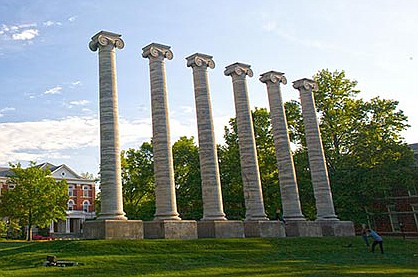The University of Missouri-Columbia is cutting the cost of some on-campus housing options starting next fall.
That's one of many changes campus leaders announced, along with new, reduced meal plan options and several others that they hope will make dorms more appealing to returning students, the St. Louis Post-Dispatch reported.
Room rates for about one-third of on-campus living options are dropping from 2.2 percent to 5 percent, depending on location. Those dorm options that aren't decreasing in cost will remain flat.
Dining costs for some plans are also changing. New options could help reduce meal costs by at least $300.
It's a risk, but one leaders think is worth taking.
"This year is an investment year to gain back trust in that this university is the University for Missouri," MU chief operating officer Gary Ward told the Post-Dispatch. "We hear families saying the cost of education is high. We will continue to look for ways - not just in student affairs and operations, but institutionally - to change that."
This is the third cost-related announcement University of Missouri leaders have made since June.
The first move was the open-educational resources model that piloted free online textbooks for 10 classes across the four university campuses and encouraged professors to explore how they can adopt such resources in their own classes.
In August, the flagship campus rolled out the so-called "Land Grants," which offer low-income students grants to cover the cost of tuition and fees. Students who are enrolled in the Honors College who also come from low-income households will have their tuition and fees plus room and board covered through the grants.
Ward said people should get used to these types of changes. It ties back to a message he's shared frequently at board meetings: It's time to be good stewards when it comes to money.
"There are families sitting around the table at night talking about affordability issues," he explained, adding MU has a responsibility as a public university to make these types of changes.
Ward estimates administrative cuts and other changes saved about $1.5 million, making it a little easier for his finance staff to stomach the idea of lowering costs.
"We need students who want to live with us," Alysha O'Neil, budget director for student affairs, said. "We're investing this year to get more (buy in) in the future."
It's no secret a dip in the freshman class has added to the struggle of filling campus dormitories. Freshmen are largely mandated to stay on campus - a normal requirement among universities to help students adjust and build a community.
Luxury apartments all over Columbia give returning students another option.
Sophomore Maggie Recca hears that all the time from students as the president of the Residence Halls Association. Off-campus options are sometimes cheaper, and they don't require a meal plan as staying in the dorms does - or did.
That's another change that Ward and his team made. If students want to come back after freshman year and live on instant noodles, they can do that starting next fall.
Ward and his team have swayed Recca to consider another new option starting fall 2018: 12-month housing contracts with no restrictions about taking classes during the summer.
There's something appealing to Recca, a St. Charles native, about not moving her stuff from a dorm room to a subleased apartment for the summer months - only to move it all back to the dorm again.
"I think that one will be attractive to students trying to gain in-state residency," she said. She was referring to a policy by which students have to prove they have lived in-state for 12 months and earned up to $2,000, among other requirements, in order to receive in-state tuition. "I can also see some coming to college and realize it's awesome having that independence and deciding they would like to get a job and be part of the community."
Ward doesn't know how all of these changes will help the university financially.
If it goes as well as he hopes, Ward said the still-new program allowing campus guests to rent dorm rooms like hotels on football game weekends could end after its first year.
"You know, this is an exciting time to be involved in public higher education," Ward said. "In a couple of years, I think the rest of the country is going to be looking at what we're doing here as an example."

